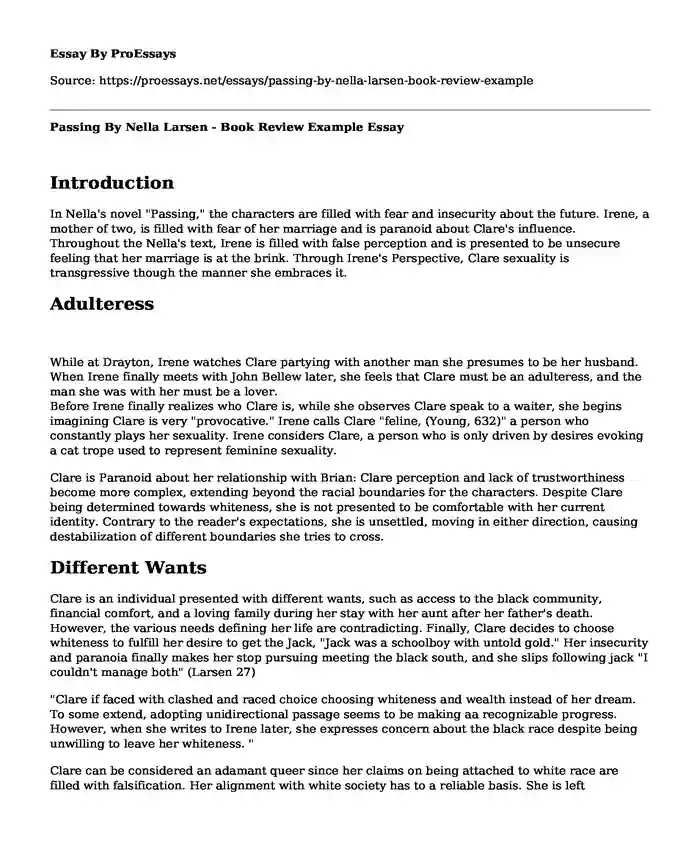Introduction
In Nella's novel "Passing," the characters are filled with fear and insecurity about the future. Irene, a mother of two, is filled with fear of her marriage and is paranoid about Clare's influence.
Throughout the Nella's text, Irene is filled with false perception and is presented to be unsecure feeling that her marriage is at the brink. Through Irene's Perspective, Clare sexuality is transgressive though the manner she embraces it.
Adulteress
While at Drayton, Irene watches Clare partying with another man she presumes to be her husband. When Irene finally meets with John Bellew later, she feels that Clare must be an adulteress, and the man she was with her must be a lover.
Before Irene finally realizes who Clare is, while she observes Clare speak to a waiter, she begins imagining Clare is very "provocative." Irene calls Clare "feline, (Young, 632)" a person who constantly plays her sexuality. Irene considers Clare, a person who is only driven by desires evoking a cat trope used to represent feminine sexuality.
Clare is Paranoid about her relationship with Brian: Clare perception and lack of trustworthiness become more complex, extending beyond the racial boundaries for the characters. Despite Clare being determined towards whiteness, she is not presented to be comfortable with her current identity. Contrary to the reader's expectations, she is unsettled, moving in either direction, causing destabilization of different boundaries she tries to cross.
Different Wants
Clare is an individual presented with different wants, such as access to the black community, financial comfort, and a loving family during her stay with her aunt after her father's death. However, the various needs defining her life are contradicting. Finally, Clare decides to choose whiteness to fulfill her desire to get the Jack, "Jack was a schoolboy with untold gold." Her insecurity and paranoia finally makes her stop pursuing meeting the black south, and she slips following jack "I couldn't manage both" (Larsen 27)
"Clare if faced with clashed and raced choice choosing whiteness and wealth instead of her dream. To some extend, adopting unidirectional passage seems to be making aa recognizable progress. However, when she writes to Irene later, she expresses concern about the black race despite being unwilling to leave her whiteness. "
Clare can be considered an adamant queer since her claims on being attached to white race are filled with falsification. Her alignment with white society has to a reliable basis. She is left disoriented from her claim. Therefore, her social and legal understanding of race keeps her in a paranoid state. Considering Clare's daughter's reference, it instills more fear in her than giving her security (Larsen 36). By being absent, Clare becomes more insecure of her daughter by promoting racial instability by undermining vertical stability.
Clare has closer access to whiteness and the associated benefits more easily despite having theoretical danger classifying herself as belonging to the white society through interaction and having similar characteristics.
Irene's reacts to differently to different situations: Throughout the text, the author presents Irene as a character-filled with fear and doubts when approaching different issues. Irene's insecurity is very dominant, especially during her relationship with Clare. Throughout the story, Irene does not feel comfortable during Clare's touch.
Conclusion
The author describes the case as "passing over a touch of derision" 67, Irene experiences a unique moment during an encounter with Clare's voice. The aspect of the race is constantly affecting the relationship between Clare and Irene. Clare is always motivated to explore the black world while Irene normative culture is to adopt white society. However, Clare is considered to have control over Irene's both social and physical contact.
The author makes Clare and Irene have the same sexual orientation in the text while creating an opposing vertical orientation on characters such as Clare and Irene. There is incomplete and unsteady control over the characters. By observing Clare's control over Irene through social and physical interaction, it can be clearly defined that there is a complex interaction between the latter. By mocking Irene's prized security and stability values by Clare, Irene becomes insecure, allowing her morals to be corrupted.
Work Cited
Young, John K. "Teaching Texts Materially: The Ends of Nella Larsen's" Passing."" College English (2004): 632-651. https://www.jstor.org/stable/4140744.
Cite this page
Passing By Nella Larsen - Book Review Example. (2024, Jan 01). Retrieved from https://proessays.net/essays/passing-by-nella-larsen-book-review-example
If you are the original author of this essay and no longer wish to have it published on the ProEssays website, please click below to request its removal:
- "Shooting an Elephant" by George Orwell: A Trap For the White Man
- Literary Analysis of "The Bell Jar" Essay Example
- Critical Essay on "The Adventure of the Speckled Band" by Arthur Conan Doyle
- Essay Example on Achilles: A Significant Contributor to World Literary History
- Essay on Yolanda's Journey: From Innocence to Understanding War in 'Snow' by Julia Alverez
- Lady Macbeth: Power & Insecurity in Over-Ambition - Essay Sample
- Essay Example on Araby: A Study of Human Interactions in Society







